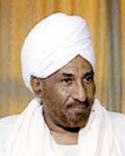INTERVIEW- Sudanese Al-Mahdi looks at SA model
By Jean-Jacques Cornish, The Mail & Guardian
PRETORIA, Apr 22, 2005 — Sudan’s last democratically elected prime minister called for a South African model of negotiation, constitution-building and reconciliation in his country, which has experienced war for all but 10 years since gaining independence more than half a century ago.
 Sadiq al-Mahdi told the Mail & Guardian, in an exclusive interview during his maiden visit to South Africa, he would seek Pretoria’s official intervention.
Sadiq al-Mahdi told the Mail & Guardian, in an exclusive interview during his maiden visit to South Africa, he would seek Pretoria’s official intervention.
This in the week when African mediation efforts to resolve Sudan’s complex political situation moved up a gear. The presidents of Egypt, Nigeria and Ethiopia were locked in talks in the Egyptian resort town of Sharm al-Sheikh to end the Darfur conflict, while the Sudanese People’s Liberation Movement/Army (SPLM/A) leader, John Garang, appealed to all factions operating in south Sudan to reconcile at a South-South Dialogue Conference in Nairobi, Kenya.
Al-Mahdi, who was deposed by President Omar al-Bashir in a 1989 coup, spent eight years in jail under both Al-Bashir and former dictator Gafaar Numeiry. He believes the much- heralded peace deal signed last January between the government and the SPLM/A is merely the beginning of addressing Sudan’s problems.
“Sudan is at the stage that South Africa was when former president [FW] de Klerk freed Nelson Mandela,” he said.
“We still have to go through the equivalent of a Codesa [Convention for a Democratic South Africa] process and we also need a truth and reconciliation exercise.”
The Umma party that he leads has made its mark opposing dictatorships in Sudan. It has recently shown a rise in popular support. Umma won 10 of 12 elections held recently on university campuses.
Its next major test of strength will be elections scheduled in three years in terms of Sudan’s north-south peace deal.
“If the protocols are implemented, if there are elections, I’m confident Umma will perform well. But there are so many problems before then,” he said.
“The protocols are based on some false assumptions. For example, the conflict in Sudan is presented simply as one between the Muslim north and the Christian south.
“In fact there are north-north conflicts. Darfur and Eastern Sudan are among these and there are south-south conflicts.
“It is also said the government of Sudan represents the north and the SPLM/A represents the south. This is untrue. These assumptions have haunted the agreement.
“Unless they are dealt with, the agreement won’t produce the stability and peace the country aspires to.
“The agreement is an action plan but in itself it is not sufficient.
Al-Mahdi said he is visiting South Africa because “its experience is exemplary to study, understand and benefit from”.
In meetings with the government and African National Congress officials, academics and NGOs he will be lobbying for South Africa to play a mediation role in Sudan as it has in other conflicts.
“South Africa is no enemy of Sudan. There would be no resentment from the Sudanese to this,” he said.
“Some mediators may not want South Africa to be involved. But the present Kenya-based mediation has reached the end of its tether. South Africa’s experience would be most beneficial in this phase of the development of the Sudanese problem.”
Al-Mahdi sees parallels between the rule of the Al-Bashir and the apartheid regime in South Africa.
“In Sudan we have a political climate not conducive to the pluralism that was growing at the end of the Eighties. At that point there was a coup and the administration that came tried to force a narrow, partisan, Islamist, Arab agenda on this pluralist society.
“We can draw many lessons from South Africa. Not only the Codesa process but also the TRC [Truth and Reconciliation Commission].
“We need to address past grievances in a non-vindictive way. That is the genius of the South African experience. Forgive, but don’t forget. The TRC successfully involved the religious dimension. Religion in public affairs addresses certain spiritual, moral and ethical aspects absent in secular politics. These are important bridge builders.”
The Oxford-educated economist, who was Sudan’s youngest prime minister at 31, said the government and SPLM/A are currently involved in a “happy-go-lucky exercise of taking the spoils in Sudan.
“The international community is happy with a success story in the peace deal and doesn’t want to look beyond it. But this apparent utopia won’t work. The deal that has been made is short-sighted: Hobson’s choice. We need to build an inclusive system that includes more than the government and SPLM/A.
“People cannot see things in proper reality now, but they will. Wishful thinking is no substitute for reality.”
